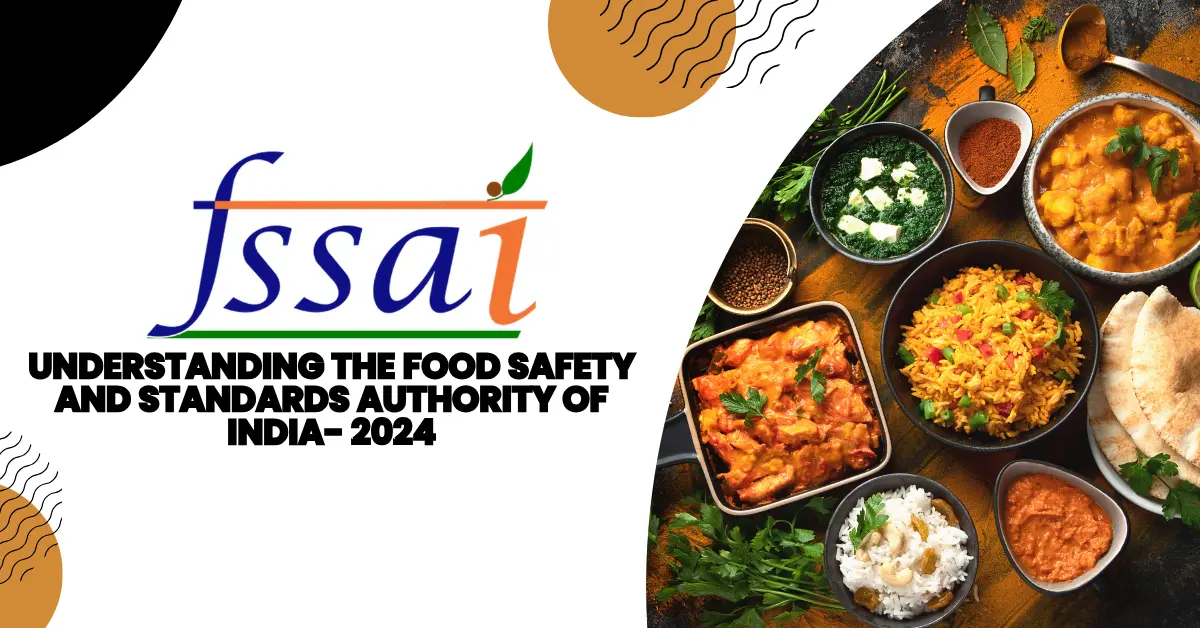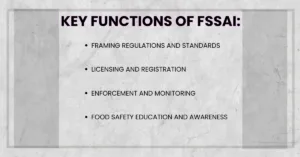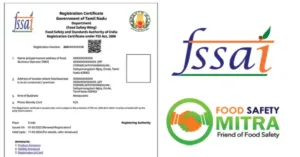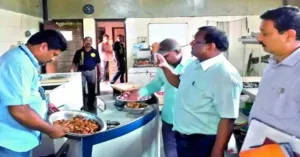
Understanding the Food Safety and Standards Authority of India- 2024
- 402
- 0
- 0
The Food Safety and Standards Authority of India (FSSAI) was established on September 5, 2008, under the Food Safety and Standards Act, of 2006. It operates with a chairperson and 22 members, entrusted with the task of setting standards for food to eliminate confusion among consumers, traders, manufacturers, and investors. The Ministry of Health & Family Welfare, Government of India, serves as the administrative ministry overseeing the FSSAI’s operations. With its statutory powers granted by the FSS Act, of 2006, the FSSAI plays a pivotal role in ensuring food safety and quality across India.
These powers include framing regulations, accrediting laboratories, providing scientific advice, contributing to international standards, collecting data, and promoting awareness about food safety and nutrition. Through these measures, the FSSAI safeguards public health and fosters consumer confidence in the food supply chain.
Introduction
The Food Safety and Standards Authority of India (FSSAI) indeed plays a crucial role in ensuring the safety and quality of food products across the nation. Its establishment in 2006 streamlined the regulatory framework, consolidating various laws and orders under one authority. With its headquarters in New Delhi and regional offices in major cities like Mumbai, Kolkata, and Chennai, the FSSAI ensures a wide reach across the country. The network of laboratories, both governmental and private, provides essential support for testing and quality control.
Under the leadership of Sudhansh Pant as the chairperson and Ganji Kamala V. Rao as the CEO, the FSSAI has been implementing measures to streamline processes for food businesses while maintaining rigorous standards. The decision to grant perpetual licenses to food businesses in 2021, contingent on annual return filings, demonstrates a move towards facilitating industry growth while ensuring compliance with regulations. For any food business in India, whether it involves manufacturing, storage, transportation, or distribution, obtaining FSSAI registration or license is mandatory. The specific requirements depend on the scale and nature of the business, highlighting the authority’s commitment to tailoring regulations to different sectors.
What is FSSAI?
The FSSAI, established under the 2006 Food Safety and Standards Act, regulates food safety and quality in India, ensuring compliance, promoting awareness, and safeguarding public health. It is responsible for laying down science-based standards for articles of food and regulating the manufacture, storage, distribution, sale, and import of food products in India.
Why is FSSAI Important?
The primary role of FSSAI is to ensure that the food we consume is safe, hygienic, and free from any harmful contaminants. It protects consumer health by setting and enforcing food safety standards across the country. FSSAI ensures the food we consume is safe and hygienic. It sets standards for manufacturing, storage, and sale of food products. FSSAI regulates food additives, contaminants, and labeling requirements. It monitors food businesses for compliance and promotes food safety education to protect consumer health from unsafe or adulterated food.
Key Functions of FSSAI (food safety and standards authority of india):

Framing Regulations and Standards
FSSAI formulates regulations and standards for the manufacturing, storage, distribution, sale, and import of food items. These regulations cover various aspects, including:
- Food additives and preservatives
- Packaging and labeling requirements
- Hygiene and sanitation standards
- Contaminants and toxins
- Methods of analysis and sampling
Licensing and Registration
FSSAI is responsible for granting licenses and registrations to food businesses operating in India. This includes:
- Food manufacturers
- Food importers
- Food service establishments (restaurants, hotels, caterers)
- Retailers and distributors
Enforcement and Monitoring
FSSAI ensures compliance with its regulations through various enforcement and monitoring activities, such as:
- Inspections of food businesses
- Food product testing and analysis
- Issuing improvement notices and penalties for non-compliance
- Recalling unsafe or non-compliant food products
Food Safety Education and Awareness
FSSAI plays a crucial role in promoting food safety education and awareness among consumers, food businesses, and other stakeholders. This includes:
- Conducting training programs and workshops
- Developing educational materials and resources
- Organizing awareness campaigns and events
Initiatives and Programs by FSSAI

By adhering to FSSAI’s regulations and guidelines, food businesses can ensure they provide safe and quality food products to consumers, while consumers can make informed choices and enjoy safe and hygienic food.
Food Safety & Standards (Food Product and Food Additives)
These regulations comprehensively define the standards for diverse food products, encompassing their composition, permissible additives, acceptable contaminant levels, and precise labeling requirements to ensure consumer safety and transparency.
Eat Right India Movement
This is a nationwide campaign launched by FSSAI to promote safe, healthy, and sustainable food practices among consumers and food businesses.
Food Safety Training and Certification (FoSTaC)

FoSTaC is an initiative by FSSAI to provide training and certification programs for food handlers, supervisors, and trainers, ensuring they have the necessary knowledge and skills to maintain food safety.
Hygiene Rating Scheme
This scheme rates food service establishments based on their hygiene and sanitation standards, helping consumers make informed choices when dining out.
Prime Locations
The Food Safety and Standards Authority of India (FSSAI) is located in four regions across the country:
- Northern Region: The regional office is situated in Ghaziabad.
- Eastern Region: The regional office is located in Kolkata.
- Western Region: The regional office is situated in Mumbai.
- Southern Region: The regional office is located in Chennai.
These regional offices enable the FSSAI to have a broader reach and more localized operations, facilitating effective regulation and oversight of food safety standards throughout India.
Departments
The Food Safety and Standards Authority of India (FSSAI) comprises several departments, each with its own specific responsibilities and functions:
- Science & Standards Division (I & II): Responsible for scientific research, development of food safety standards, and ensuring compliance with established standards.
- Regulations Division: Handles the formulation and implementation of regulations related to food safety and standards.
- Quality Assurance Division (I & II): Focuses on ensuring the quality of food products through testing, inspection, and certification processes.
- Regulatory Compliance Division: Oversees compliance with food safety regulations and standards by food businesses and other stakeholders.
- Human Resource & Finance Division: Manages human resource allocation and financial matters within the FSSAI.
- General Administration and Policy Coordination Division: Handles general administrative tasks and coordinates policy development and implementation.
- Information Technology Division: Manages IT infrastructure and systems to support the operations of the FSSAI.
- Social and Behavioural Change Division: Engages in activities aimed at promoting awareness and bringing about behavioral change regarding food safety and nutrition.
- Trade and International Cooperation Division: Facilitates cooperation with international bodies and oversees trade-related matters concerning food safety standards.
- Training Division: Conducts training programs and capacity-building initiatives for FSSAI staff and other stakeholders involved in the food industry.
- Rajbhasha: Deals with the implementation of the official language policy and related matters.
These departments work collaboratively to fulfill the FSSAI’s mandate of ensuring the safety and quality of food products and promoting public health and consumer welfare in India.
Research & Quality Assurance

The Food Safety and Standards Authority of India (FSSAI) places significant emphasis on research and quality assurance to ensure the safety and quality of food products across the nation.
Research
Under the Research and Development division, FSSAI conducts research with the primary objective of generating new knowledge to continuously update and upgrade food safety standards in line with international organizations. Additionally, evidence-based studies are carried out to enhance or establish rules and regulations about food safety.
Quality Assurance
FSSAI is tasked with various functions related to maintaining the quality and standards of food and beverages. One crucial aspect of this is the accreditation of laboratories to conduct food testing. FSSAI lays down procedures and guidelines for the notification of accredited laboratories, adhering to standards such as ISO17025.FSSAI has classified notified laboratories into different categories:
- FSSAI Notified NABL Accredited Labs: These are laboratories accredited by the National Accreditation Board for Testing and Calibration Laboratories (NABL) and notified by FSSAI. Currently, there are 112 such laboratories.
- State Labs: These are laboratories established by various state governments across India to support food testing and quality assurance efforts. FSSAI recognizes and collaborates with these labs to strengthen food safety infrastructure. Currently, there are 72 state labs.
- Referral Labs: These are specialized laboratories designated by FSSAI for conducting advanced testing and analysis, particularly for complex or high-risk food samples. Currently, there are 22 referral labs.
By ensuring the availability of accredited laboratories and researching to enhance food safety standards, FSSAI plays a vital role in safeguarding public health and promoting consumer confidence in the food supply chain.
Conclusion
The Food Safety and Standards Authority of India plays a pivotal role in safeguarding public health by ensuring the safety and quality of food products across the country. Through its comprehensive regulations, licensing procedures, enforcement activities, and awareness programs, FSSAI strives to maintain high standards in the food industry. By promoting food safety practices, educating stakeholders, and monitoring compliance, FSSAI empowers consumers to make informed choices and enjoy safe and hygienic food. As India’s food landscape continues to evolve, the authority’s efforts in fostering a robust food safety culture are crucial for building trust and protecting the well-being of the nation’s citizens.
FAQs
1. What is the use of FSSAI?
FSSAI is useful for keeping our food safe and clean. It makes rules and checks that companies follow when making, storing, or selling food items. This helps prevent us from getting sick by eating bad or contaminated food.
2. Why is FSSAI important?
FSSAI is important because it protects our health. It ensures that the food we buy from shops, restaurants, or vendors is not spoiled, has no harmful chemicals, and is prepared in a hygienic way. Without FSSAI, we could easily get sick from eating unsafe food.
3. What is an FSSAI certificate?
An FSSAI certificate is a license or registration that food businesses need to operate in India. It shows that they follow FSSAI’s rules and standards for food safety. Different certificates are given to manufacturers, importers, restaurants, and other food businesses.
4. How do I claim an FSSAI certificate?
To get an FSSAI certificate, food businesses must apply online or through a district office. They need to provide details about their business, follow FSSAI’s requirements, and pass inspections. Once approved, they receive the certificate, which must be renewed periodically.
5. Why do food businesses need an FSSAI certificate?
Food businesses need an FSSAI certificate because it is mandatory by law. Without it, they cannot legally manufacture, store, distribute, or sell food products in India. The certificate ensures they comply with food safety norms and can face penalties if found operating without it.
Also Read:
Empowering Girls With The Ladli Behna Yojana – 2024
References:
https://en.wikipedia.org/wiki/Food_Safety_and_Standards_Authority_of_India
https://www.facebook.com/fssai/
Disclaimer: This article is for informational purposes only. While we strive to provide accurate and up-to-date information, please consult official sources or the FSSAI website for the most current regulations and guidelines. My BlogPod is not responsible for any inaccuracies or changes in the information presented.
